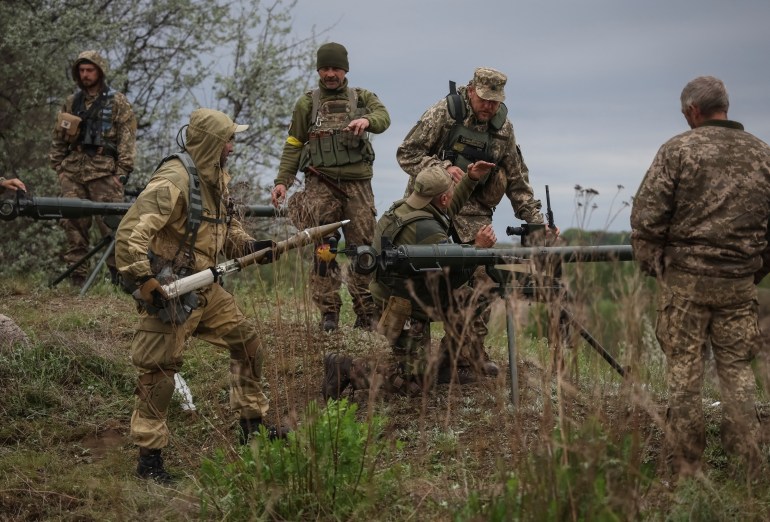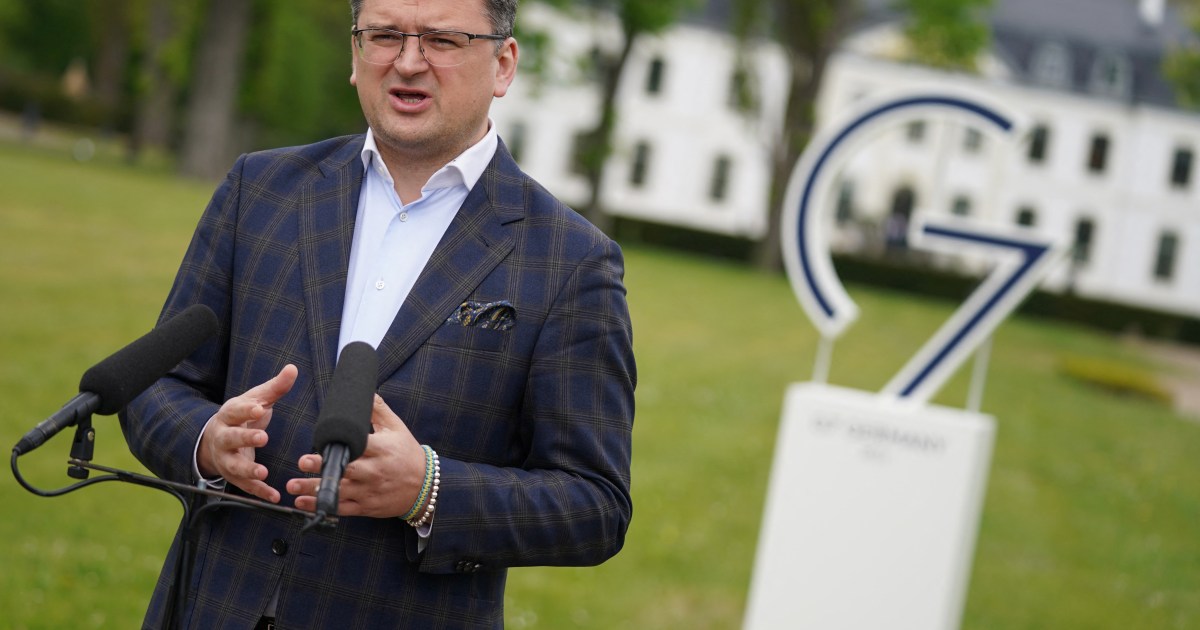Ukrainian FM: ‘100% we will win, and Russia will be defeated’
Ukrainian Foreign Minister Dmytro Kuleba has appealed to Group of Seven (G7) nations to provide more military aid and support Kyiv in the fight against the Russian invasion, including more sanctions on Moscow.
Kuleba, who was invited as a guest at the meeting of foreign ministers from the group of world’s richest nations in Weissanhaus, Germany, also called for a ban on Russian oil imports and the seizure of Russian assets abroad to pay for the post-war reconstruction of Ukraine.
For its part, the European Union announced a further 500 million euros ($520m) package for Ukraine to further bolster its defences against Russia.
Al Jazeera’s Diplomatic Editor James Bays sat down with Kuleba over the weekend in a wide-ranging interview covering issues such as the expansion of NATO, sanctions and how the war is likely to end.
Al Jazeera: The EU has announced that it’s going to give another five, over 500 million euros, bringing the total to over a billion that it’s giving to buy weaponry for Ukraine, including heavy weaponry. In terms of the G7 as a whole, is that enough? Is that what you need?
Dmytro Kuleba: The additional 500 million euros to the European peace facility, they bring the total sum to two billion ($2.08bn). So it’s now two billion euros that the European Union has allocated to the military defence needs of Ukraine. And of course, this is much appreciated. We still have some outstanding issues with regard to military supplies. But in principle, we are now in a much better position compared to where we were, let’s say, months ago.
Al Jazeera: In terms of sanctions … there’s a new EU sanctions package under discussion, and that would go even further, it would stop oil imports from Russia. There is one country at the moment that is blocking that, Hungary. Why do you think Prime Minister [Viktor] Orban is blocking that?
Kuleba: Well, the official line of Hungary says that this oil embargo, as it was proposed by the European Commission [EC] does not accommodate a number of Hungarian concerns. And therefore, the EC engaged in a conversation with Hungary to accommodate those concerns… And we will see whether Hungary was blocking the oil embargo because of its national concerns… or they’re doing it for some other reasons of higher political consideration.

Al Jazeera: If Orban goes ahead and vetoes this package, what actions should the EU take?
Kuleba: Well I’m afraid the European Union will face a precedent, a risk of creating a precedent when the unity was broken, when the unity on Russia was broken, and this will be the first such case since 2014. I believe that it will cause a lot of damage for the European Union itself.
Al Jazeera: This month is the 75th anniversary of the Marshall plan, the plan that helped the US rebuild much of Europe after World War II. Does your country need its own martial plan now?
Kuleba: Yes, and we already see the outline of this Marshall Plan. How it will look like. It will consist of three main contributions. The first will be the support coming from partners and friends of Ukraine. The second, and the largest amount of money will come from the frozen Russian assets which will be handed over to Ukraine.
And there is a sufficient amount of those assets to reconstruct and rebuild Ukraine. If Russia destroyed it, it’s more than natural to rebuild everything with Russian money. They must pay for all the damage that they inflicted on us. And the third source of financing will be actually Ukrainian resources, financial and human. I have no doubt that there will be a Marshall Plan, whatever name it will have, as a programme that will help Ukraine to reappear from [the] ashes of the war.
Al Jazeera: You still want to join NATO and the EU ultimately. Let me ask you first about NATO because you’re not going to join that anytime soon but two countries are, Finland and Sweden. Russia says that it may retaliate if they join NATO. Do you think they need to be worried?
Kuleba: No. Russia is not as brave as it pretends to be. They will not take the risk of military conflict with NATO.

Al Jazeera: Some pro-Russians in Kherson who are now saying to Vladimir Putin, please come and annex this city, annex this region. Do you think this is part not of a call by them, but a deliberate next stage of the Kremlin strategy?
Kuleba: The occupation of Kherson by Russian forces started with large rallies, people wrapped in Ukrainian flags, singing national anthem and demanding occupants to go. Russia dispersed them with tear gas, with batons. They brought in FSB agents to suppress any resistance in Kherson.
Now, of course, the Russians are trying to set the stage for legitimisation of their presence on the ground. I don’t know what the final outcome will be. Will they try to attach Kherson to Crimea? Will they try to set up a new region and recognise it? It’s still unclear. But it is absolutely clear that Russia is trying to root itself in Kherson, and it considers Kherson region as its territory.
Al Jazeera: How does this war end? The French foreign minister Jean-Yves Le Drian said the plan is to support Ukraine until victory. What from your point of view does victory look like? Are you trying to turn the clock back to the beginning of February? Or are you trying to turn the clock back to 2014?
Kuleba: 2014.
Al Jazeera: So you want to get all of the Donbas and you want to restore Crimea under Ukrainian control?
Kuleba: I’m a Ukrainian foreign minister, how can you expect me to say that I do not want to restore [the] territorial integrity of my country? No one in Ukraine or in Europe seems to have doubt that Ukraine will win. The question exactly is what will victory look like, and how specific elements of victory will be achieved. Some things can be regained by military force, others can be regained by diplomacy. In the end, victory is a combination of two – military victory on the ground and diplomatic victory at the negotiating table.
So we will get that I think. I appreciate your interest in how the victory [would] look like, I do not know the exact parameters yet. But I give you 100 percent that we will win and Russia will be defeated. This is also another element that everyone has to understand – the victory of Ukraine implies defeat of Russia.
Editor’s note: Al Jazeera’s Usaid Siddiqui and Beatrice Zemelyte helped compose this interview, which has been edited for clarity and length.




